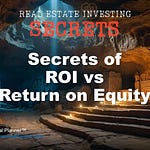In this module (11 of 46 in the Real Estate Investing Secrets course), you will learn:
What do you do if you wake up one morning and realize that you’re behind on saving for retirement? What can you do to get back on track? Or, better yet, what can you do to get ahead?
Where do most of us begin? What should we do as our first step? What should we try to avoid? What should we aim for ideally? And, what is the end goal?
Why “WHAT” you do with your money matters—especially when catching up on retirement saving.
The three primary buckets for catching up…
The bucket you can rely on the least and why you have little to no control over that bucket… but the one thing we can do to increase our chances with this bucket.
A simple discussion of the second bucket… and what’s one little thing—with the dirty B word—that you can do to help jumpstart your catch up.
What are the ways we can increase earnings to help us catch up saving for retirement?
A discussion on why time saving for retirement does not seem linear: it doesn’t usually take you 10 times longer to save a million than it takes to save $100K. In fact, it may only take you 3 times as long—or less… with the math proving this to be true.
A little trick to get that first $100K faster, easier and with less risk than you imagined
A discussion of the last 150 years of S&P 500 annual returns… including some surprising facts about what is normal investing in stocks.
How does the last 150 years of S&P 500 annual returns compare to the last 133 years of real estate appreciation? Which one is better? Why do I say that?
But, what about leverage? What if we leverage when investing in the S&P 500? What if we leveraged investing in real estate?
But, what about the 3 other areas of return with real estate investing… cash flow, debt paydown and tax benefits? How do those come into play?
How risky is investing in real estate for appreciation? A preview of upcoming module on risk and specifically our Risk Matrix: Appreciation to understand how likely you were to see property values increase and by how much plus how likely you were to see property values decline and by how much.
What might you expect to earn from an unleveraged rental property purchased for all cash? How does the return on investment vary for the same property depending on how you finance it (5% down, 15% down, 20% down, 25% down, 30% down, 40% down and all cash or 100% down). How does the return vary if you opt to utilize a vastly improved cash flow strategy like Nomad™ to Short-Term-Rentals? How can this impact your ability to catch up for retirement?
The briefest introduction to a future module on return on equity.
Plus, much, much more…
Secrets of Retirement Catch-Up
Here are the slides from the presentation for your convenience…
Listen to this episode with a 7-day free trial
Subscribe to Real Estate Financial Planner™ to listen to this post and get 7 days of free access to the full post archives.










